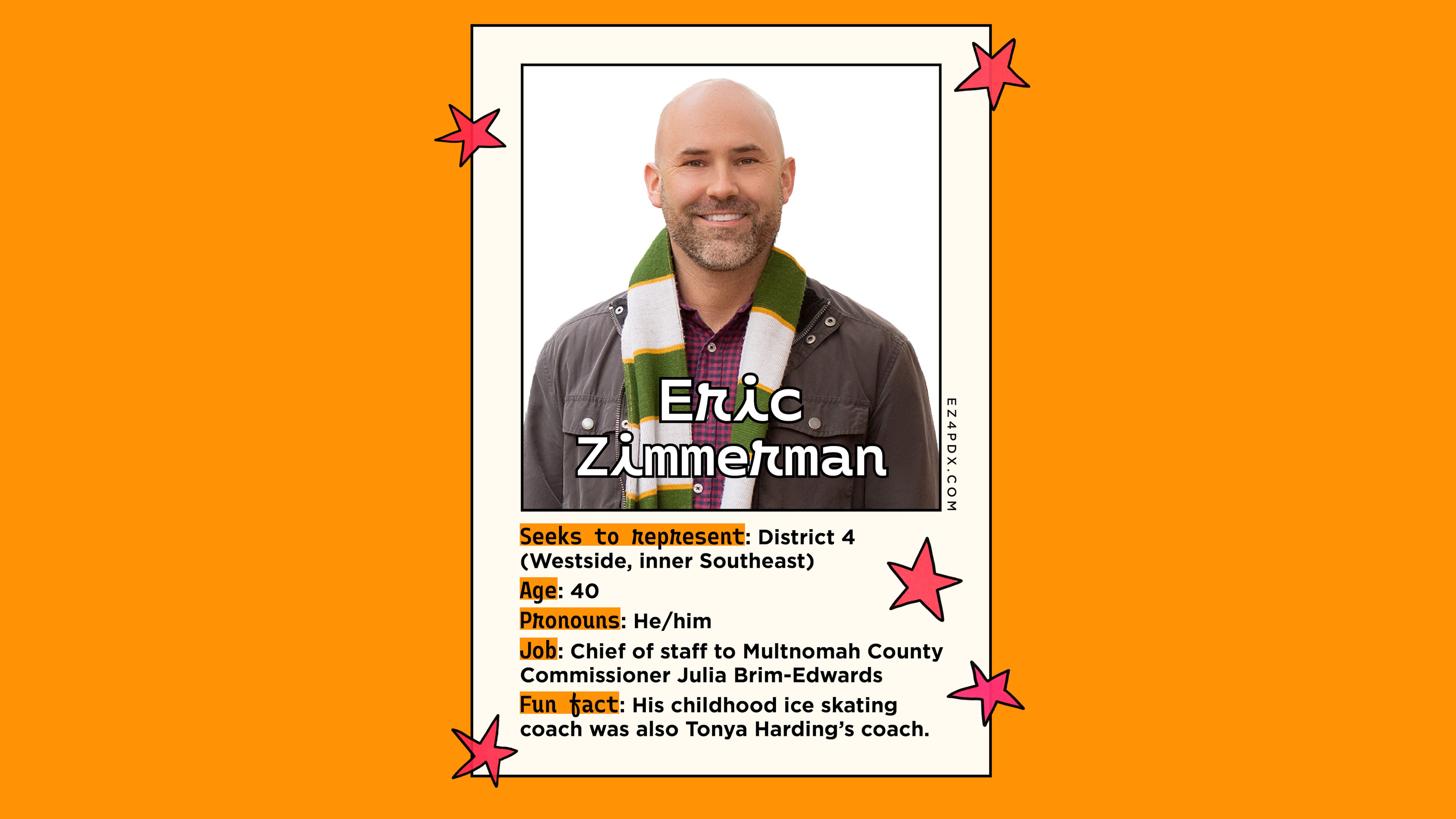Seeks to represent: District 4 (Westside, inner Southeast)
Age: 40
Pronouns: He/him
Job: Chief of staff to Multnomah County Commissioner Julia Brim-Edwards
Fun fact: His childhood ice skating coach was also Tonya Harding’s coach.
“My entire life, I feel like I’ve responded to crisis,” Eric Zimmerman says. “It just so happens that today, that crisis is my own hometown.”
Zimmerman was born in Portland and grew up in the city. His mom was a Portland Public Schools teacher, and he attended the University of Portland on a U.S. Army ROTC scholarship. After graduating, he served as a platoon leader in western Iraq before returning to Oregon and serving on the Multnomah County Veterans Task Force. He’s stayed involved in local issues and was previously a senior adviser in the mayor’s office. He is currently the chief of staff to County Commissioner Julia Brim-Edwards.
But now he wants to represent District 4 and help Portland out of its homelessness crisis.
“I’ve been all over this world in service to our country, and I’ve worked all across Oregon,” he says. “What we’ve let happen over the past decade or more, with respect to unchecked camping, rampant and unchecked drug use, the trash, the zombie RVs in every corner of the city, I think it is inexcusable.”
Zimmerman’s campaign has raised $79,000, which means he’s unlocked $40,000 in matched funds. He’s been endorsed by city commissioners Rene Gonzalez, Mingus Mapps, Carmen Rubio and Dan Ryan. He’s also been endorsed by the Northwest Oregon Labor Council, IBEW 48, LiUNA 737 and Multifamily NW.
We spoke to Zimmerman about his campaign. The conversation has been lightly edited for brevity and clarity.
WW: What are your top three priorities if elected?
Eric Zimmerman: Public safety and livability, and then enforcing the camping regulations and cleaning up our streets, and then deep reforms to our housing development policies to allow for quicker and more affordable housing to be developed.
Do we need more or fewer police officers than we currently have?
We need at least 200 more, and as those grow in rank, we need to increase the number of neighborhood response officers available in each precinct.
How would you foster economic growth in Portland?
I think the best path for us is twofold. One tack is creating a clean, livable and safe community so we can shake off the bad reputation we’ve earned over the past few years, and inviting back tourism and retaining major employees and employers. The other side is housing has to be accessible for workers. Making housing, whether rental or ownership, attainable is incredibly important for our economic picture. If we do those two things, then we have a lot to naturally offer the market. Prosper Portland is making some important directional changes in terms of major industry hubs we want to site in Oregon. But it won’t matter if our city is not clean, not livable, not safe, and nobody can afford to live here.
Do you support the city’s camping ban, and do you think the Multnomah County Sheriff should be booking people arrested for violating the ban?
I fully support the camping ban, and I’ll ensure the city enforces the regulations we have on the books. And yes, after being offered numerous services and refusing to follow the law, I think the sheriff should book people who violate city law—and they do so out of choice.
Which current city commissioner do you and your policies most align with?
I’ve been endorsed by the entire City Council. I’ve worked on important livability and public safety issues with each of them. I will say Dan Ryan is probably the person whom I most associate with today. Neither of us is dogmatic on issues. We both understand nuance and the complexity of the things that come in front of us, and I think we both made and will continue to make the tough decisions.
What is the first piece of policy or legislation you would bring to the City Council?
The expansion of the Neighborhood Response Teams inside the police bureau. The Neighborhood Response Teams are a special team for each precinct, and they work with the neighborhoods to deal with really problematic, entrenched types of items. Their problems are sometimes legal problems, but they probably aren’t emergency 911-type calls. They work on the theft rings or they work on the graffiti rings or the camp that’s a hotbed for dealing or trafficking. They’re our closest version when we talk about community policing.
Do you support Carmen Rubio shifting some Portland Clean Energy Fund dollars to city bureaus?
Generally, yes. There are a lot of environmentally related uses across the bureaus where some PCEF could be reasonably spent. I’d like to see it at least somewhat connected to the original intent. Commissioner Rubio had to save PCEF from the distrust generated within the community, and I think the public should get to weigh in again on the new direction for PCEF, with respect to what’s it going to be used for and reasonable fund estimates so it’s a little bit more connected to reality—and to dust off some of that distrust.
See the other Portland City Council Candidates here!
 This article is part of Willamette Week’s Ballot Buddy, our special 2024 election coverage. Read more Ballot Buddy here.
This article is part of Willamette Week’s Ballot Buddy, our special 2024 election coverage. Read more Ballot Buddy here.

